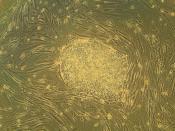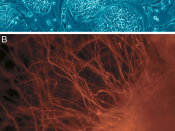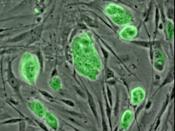Stem cell research is an ethical controversy because of the way the cells are collected. The most controversial method is the use of embryonic stem cells. Embryonic stem cells are derived from embryos that develop from eggs that have been in vitro fertizilized (usually at a clinic) and then donated for research purposes. They are usually 4-5 days old when used. (Stemcells.nih.gov).
The embryonic stem cells can be used to test new drugs, cell based therapies, offer possibility of a renewable source of replacement cells and tissues to treat diseases such as Parkinson's, Alzheimer's, spinal cord injury, stroke, burns, heart disease, osteoarthritis and rheumatoid arthritis. (Stemcells.nih.gov). the stem cells hold great potential for the development of new forms of medicine to treat debilitating or fatal conditions that otherwise would be not curable. (Williams & Johnson).
The federal government has had to step in with deciding what is ethical and what is not when it pertains to stem cell research especially embryonic stem cells.
The current federal policy, which was created by the Bush administration in 2001, allows federal money to be used to support stem cell research. However, it has three very strict guidelines. The first one is that the donors fill out an informed consent form. The second is that the embryos must be created for reproductive purposes. The third one is it must be before the date of the policy. (Williams & Johnson).
The central question facing Congress over stem cell research is how to treat embryonic stem cell research. The problem with the research is the use of embryonic stem cell research can lead to lifesaving procedures but it requires the destruction of embryos. Congress is facing a range of policy options which all is followed with ethical dilemmas. Congress could let federal funding for embryonic stem...


